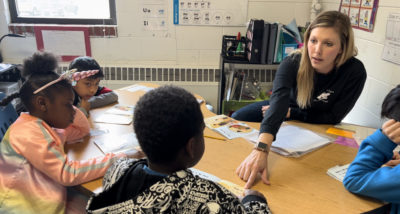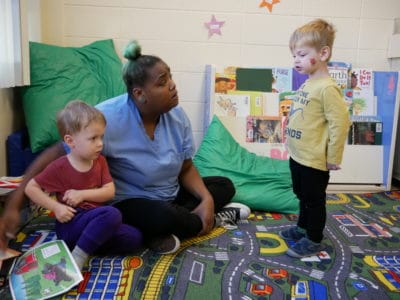

Nationally there are approximately 1.4 million children under the age of 6 experiencing homelessness (as defined by the McKinney-Vento Homeless Assistance Act).
I have worked on early childhood homelessness and the early childhood workforce for a number of years, at the Administration for Children and Families (ACF) in the Office of Early Childhood Development and then at Child Care Services Association (CCSA). These two areas are intricately intertwined and both impact the future of our state and our country.
Recently I had the honor of attending my first NC Interagency Council for Coordinating Homelessness Programs. Co-Chairs Laura Hogshead and Erika Walsh led this meeting and they laid out a clear direction for this council. They want this to be an active, action-oriented group, and we were asked to come to the meeting with ideas and questions about the challenges we can resolve as a group and the opportunities not yet realized.
I was thrilled to have Gov. Roy Cooper welcome us to this work. He talked about the important and challenging work ahead and shared a story of earlier days as a tutor when he wanted to bring books to one of his pupil’s homes but learned that was not so easy because that child did not have a permanent home. The governor’s message to us was clear, “We want him to be successful when he doesn’t even know where he will sleep.”
It is important to think about families experiencing homelessness, especially our infants and toddlers who have their whole futures ahead of them. We need to give them a good start. We are at a tipping point, and our young children’s futures hang in the balance. We want them to have beds to sleep in, high-quality child care, and all the support necessary for them to become our leaders in the years ahead.
We also heard from Jeff Olivet, the new executive director of the U.S. Interagency Council on Homelessness (USICH). He talked about reframing homelessness as a public health crisis, amplifying the voice of those who have experienced homelessness, eliminating racial disparities, scaling effective housing and supportive services, and working on prevention. I hope the new strategic plan to end homelessness recognizes that families with young children need housing and supportive services to change the future for all of us.
CCSA is part of the National Collaborative for Infants and Toddlers, along with more than 2500 local, state, and national organizations representing business leaders, pediatricians, child care providers, parents, state and local officials, advocates and researchers who know our nation needs bold leadership to secure the futures of our youngest children. Zero to Three just released the State of Babies Yearbook 2022. That report says, “The pandemic revealed the fragility and insufficiency of the many systems that should ensure stability among the nation’s families, particularly those with young children during their critical first three years.” Our youngest children and their families experiencing homelessness will need bold leadership and action — beds to sleep in, high-quality child care, and an educated workforce who can provide support and stable care in the crucial early years.
There are approximately 1.4 million children under the age of 6 who experience homelessness, and data from the United States Department of Education shows many of them are not enrolled in early learning, one strategy to support families experiencing homelessness. North Carolina’s Preschool Development Grant (PDG) is supporting many projects that impact the early years. Two small projects that focus on early childhood homelessness include a strategic planning process for the Yay Babies Homelessness Workgroup and using the Early Childhood Self Assessment Tool for Family Shelters (ECSAT) through work with Partners for Impact who is also embarking on a community systems project with CCSA. A recent report noted the work of the ECSAT.
“The ECSAT is helping shelter staff consider areas of improvement that they had not previously considered. Staff have remarked that they now understand that just working with the parent is not enough to meet the needs of the children. They realize that they need to shift their focus, their policies, and their practices to more intentionally identify and address the needs of each child that enters their shelters.”
The NC Homeless Education Program is working closely with SchoolHouse Connection, the Head Start Collaboration Office, and the many McKinney-Vento liaisons across the state on the launch of the Head Start Referral App. This app is being developed as a tool to help LEA McKinney-Vento liaisons identify young children experiencing homelessness and refer them to Head Start.
There are other initiatives happening and I hope they all raise awareness of the seriousness of this issue. Families with young children experiencing homelessness are nearly invisible. Last fall, CCSA released a report on early childhood homelessness, finding that 30-40% of those who are homeless are families with young children. But, because families often stay with friends or extended family, stay in motels or hotels, sleep in cars, or stay in shelters rather than sleep on the streets, childhood homelessness is often hidden from public view.
We can and should address the root causes of homelessness in addition to providing early intervention support for young children in these families. Good jobs. Access to affordable housing. Access to medical care, including mental health services. Paying a living wage. These are but some of the challenges that push a family into homelessness and how our young children become nearly invisible.
While we wait to see whether Congress will pass additional funds for early childhood and housing services, it is time for communities to come together to collaborate on affordable housing initiatives for families with young children and to look for every opportunity possible to provide supportive services for families with children under age 6 experiencing homelessness, including early intervention and high-quality child care. Our children’s future trajectory depends on it.
I look forward to being part of the NC Interagency Council for Coordinating Homelessness Programs. I hope to work side-by-side with others who are passionate about this work. Thank you, Gov. Cooper, for your support of this important work.
If you are looking for more information on early childhood homelessness, here are just a few resources from CCSA, the U.S. Department of Education, and national nonprofit SchoolHouse Connection.




